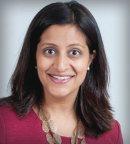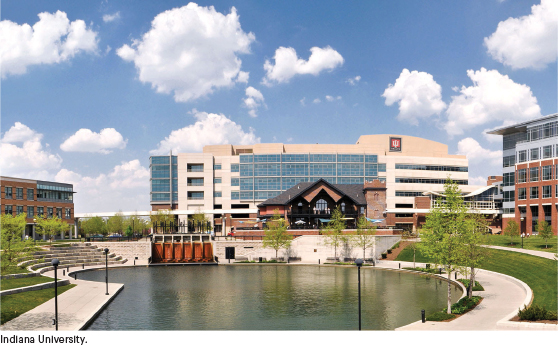By way of her family lineage, Aparna Parikh, MD, seemed destined for a career in medicine. “Both of my parents are physicians, as well as my maternal grandfather. I have two other siblings, all of whom are in the medical field. Medicine has always been part of my life since childhood. My parents are from India, and my mother was the first female physician in her family; at that time, it was an unusual profession for a woman. In fact, she was among only 15 women in a medical class of more than 200 students,” she shared.

Aparna Parikh, MD
Dr. Parikh continued: “Both of my parents recall their own sense of responsibility for caring for the poorest of the poor in India and how gratifying it was to practice medicine there. My mom was drawn to obstetrics, and my father ultimately became an anesthesiologist. Interestingly, my paternal grandfather, though in government work, started one of India’s first dedicated cancer hospitals. There’s a plaque at the entrance to the hospital memorializing his contributions to public health in India. So, medicine was simply a way of life for us, a tradition that I saw as a calling. Seeing my mother sacrifice her career and love of medicine for her children, influenced my desire not only to become a doctor but a doctor who would maintain some commitment to social justice and equity.”
A Mother’s Sacrifice
Dr. Parikh’s parents had an arranged marriage; although her mother remained in India to finish her medical training, her father emigrated to the United States, eventually settling in Marion, a small city in north central Indiana. “Marion seemed like an odd place for my father to choose as a place to ultimately bring his family, but his older brother had relocated there from India years before, so that was the impetus. After my mother joined my father in the United States, they started a family, and my mother gave up her medical career to stay home and nurture us through childhood. She loved medicine and seeing her sacrifice her career for us inspired my sister and I tremendously,” said Dr. Parikh. “There’s now a new joke among Indian parents. First, we all had to be doctors or lawyers but now, with Kamala Harris, we can be vice presidents.”
During high school, Dr. Parikh spent most summers in India with her family, which opened her eyes to the health-care challenges faced by people in low- and middle-income countries. The experience also informed her sensibilities and appreciation for the widespread inequities of care, planting the seed for her future career with a commitment to global health as well.
Growing Up in a Minority Community
“Marion was an interesting place,” related Dr. Parikh. “It had a darkly checkered past, including brutal segregation that culminated in the public lynching of two Black men falsely accused of a crime. I was part of a small, somewhat isolated, yet very close-knit Indian community in our town. Our high school had one of the highest teen pregnancy rates in the country and a high dropout rate. The vast majority of students who actually went on to college remained in the state. I recall taking the SAT IIs alone in the principal’s office because I was one of the few students considering out-of-state options for college. I felt that it was important for me to leave Indiana for my own growth and looked at colleges in larger and more liberal cities.”
Blossoming in College
After graduating high school, Dr. Parikh entered Northwestern University in Chicago for her undergraduate work. “High school in Marion taught me a lot about the world and the sociopolitical divides we see today, but it was in college where my career yearnings truly blossomed. Although, I remember even as a kid after the loss of the daughter of a family friend who developed a childhood leukemia, I started to think about oncology a bit. I do remember getting a C in organic chemistry, and my advisor said I’d just burned my bridge to medical school. I sort of laugh now about him saying my career path had ended because of one poor grade,” said Dr. Parikh.
“The goal of our fellowship exchange program is to provide much-needed training for cancer specialists in the face of a rapidly increasing incidence of cancer in sub-Saharan African countries.”— Aparna Parikh, MD
Tweet this quote
The hard sciences did not excite Dr. Parikh, and for a while, she pondered a career in public health and majored in sociology and psychology and minored in anthropology. “During college, I also had the opportunity to spend time abroad, and this reinvigorated my passion for medicine. I ultimately went to the Indiana University School of Medicine (IU), where I had some outstanding educators, such as Larry Einhorn, MD, George Sledge, MD, and Pat Loehrer, MD. Dr. Loehrer gave me a CD compilation on seminal papers in gastrointestinal cancer which I still have and they actually encouraged me to attend my first ASCO meeting, which as a medical school student completely overwhelmed me,” said Dr. Parikh.
Oncology Calls
Dr. Parikh seriously contemplated a career in infectious diseases; however, as she spent more time in sub-Saharan Africa, the unmet needs of patients with cancer resonated with her growing passion for global health. When her uncle developed gastric cancer, it once again brought the disease close to home.
After attaining her medical degree from IU, Dr. Parikh did her residency at Massachusetts General Hospital (MGH), Boston. “MGH had such a great residency program, and I can’t begin to list all the terrific mentors who influenced me there. Yet the mentor who probably had the greatest overall impact on how I view my place in medicine and allowed me to truly cherish the privilege of being a doctor was Dr. Hasan Bazari. He is actually a nephrologist but had such profound insights into the humanism in medicine.
“Even though I don’t have the classic ‘lab science brain’ associated with oncology,” continued Dr. Parikh, “I felt the people skills I’d developed during my global work made up for it. I also met ASCO member Beverly Moy at MGH, who stressed the need to address the inequities in cancer care. Also, it was during my residency when my uncle in India died of gastric cancer, and I vividly remember how abysmal the pain and palliative care services were for him. This remains such a critical issue in low- and middle-income countries.
In the back of my head, I was drawn to oncology, but I didn’t then have a firm grasp on how I could work my passion for global health into the field. Ultimately, it was the confluence of several factors that solidified my decision to become an oncologist,” said Dr. Parikh.
Dr. Parikh met her future husband at an MGH picnic just before her intern year. “At the time, I was doing global health outreach work in Haiti, India, and Tanzania; he would happily come along, was incredibly supportive, and found meaningful work to do as well. He jokingly said that for our honeymoon, maybe we could do a place that had tropical drinks with umbrellas on the beach and not a tent in Haiti, though in all seriousness, both of us valued the global work tremendously and feel that with privilege also comes great responsibility, ” said Dr. Parikh. I’ve been really lucky to have a partner who has supported my passions and career goals. He’s been my biggest champion and nurtured a life for our family that has allowed me to continue to do the things that are important to me without having to make the same sacrifices my mom made all those years ago.
After completing her residency, Dr. Parikh did her medical oncology fellowship at the University of California San Francisco Medical Center (UCSF). “At UCSF, I worked with Dr. Alan Venook. He took me under his wing and was a phenomenal mentor but also a tremendous human being and compassionate physician.
One of my co-fellows and dear friends was diagnosed with gastric cancer during our fellowship. She ultimately succumbed to the disease, and this deeply impacted me, but to this day, I will also remember Dr. Venook’s care of her,” said Dr. Parikh. “I got to share her story at the 2020 ASCO Annual Meeting, which was an honor. She was a remarkable woman and shaped how I care for my patients to this day and also taught me so much about gratitude in the face of adversity.”
From Industry and Back to MGH
After her fellowship, while her husband was finishing his medical training, Dr. Parikh’s career took an unlikely path. “After a series of unexpected twists and turns, Dr. Venook suggested I consider a post doc role at Genentech, which I applied for shortly thereafter and was recruited for a full-time job at Genentech. Although it was probably the last career move I thought I’d make, I got to dive into exciting translational science and learn about the intricacies of drug development and was less intimidated by translational science.
I was eventually recruited by MGH as there was a need in the gastrointestinal group for a clinical translational faculty member. I quickly started to work with Ryan Corcoran, MD, PhD, Director of the Gastrointestinal Oncology group. It was with Dr. Corcoran where all of my exciting liquid biopsy work began. I also started to see patients regularly with Ted Hong, MD, Director of the Department of Gastrointestinal Radiation Oncology, and we would brainstorm constantly. Dr. Hong and I now have a robust portfolio of investigator-initiated trials in the gastrointestinal oncology space. Both are outstanding mentors and colleagues. I feel lucky to have a truly wonderful MGH work family all around,” Dr. Parikh commented.

Although Dr. Parikh’s day job focuses on seeing patients with gastrointestinal cancer and clinical translational research, she still maintains her global health initiatives. She noted that on one trip back from Africa, she and Bruce Chabner, MD, Director Emeritus at the MGH Cancer Center (“another wonderful mentor”) developed the Program for Enhanced Training in Cancer -(POETIC), which is a fellowship exchange program that partners with several Sub-Saharan African countries.
“Our goal is to provide much-needed training for cancer specialists in the face of a rapidly increasing incidence of cancer in sub-Saharan African countries and to develop capacity by supporting these young physicians who are committed to staying in Africa,” said Dr. Parikh.
‘Just Live Life’
What does a busy clinician and researcher do to de-stress? “My new baby daughter was born on election night, which, given the unique time we’re in, makes it even more special. So, a major part of my nonwork time is spent nurturing my three girls to become good global citizens. I also exercise regularly, alongside many other women in oncology, do a lot of outdoor activities with the family, and have a wonderfully supportive group of girlfriends. Ultimately, I just live life, one busy intertwined day at a time, but with a commitment to make the world a little brighter for my girls.”
DISCLOSURE: Dr. Parikh has served as a consultant or advisor to Eli Lilly, Pfizer, Checkmate Pharma, DSMC for Roche, and Equity C2i Genomics, and has received institutional research funding from Bristol Myers Squibb, Novartis, Novartis Pharmaceuticals UK Ltd, Plexxikon, Takeda, Puretech, and PMV Pharma.

